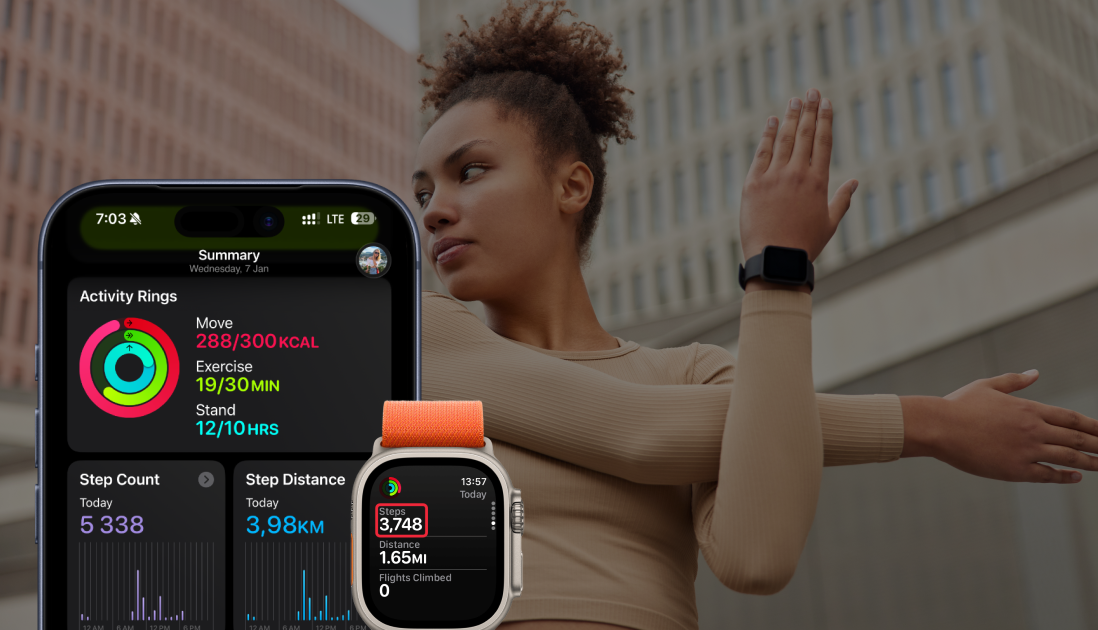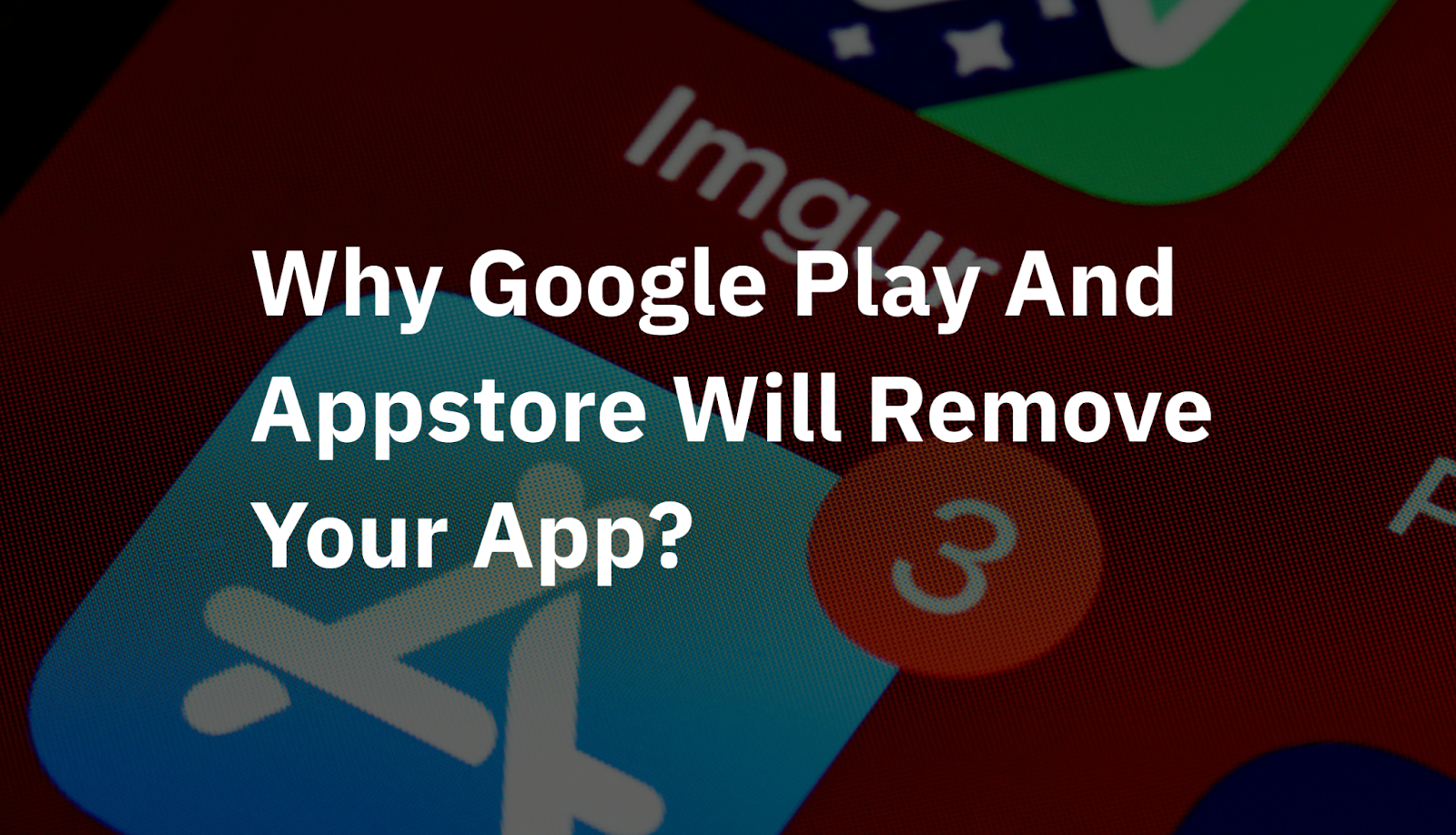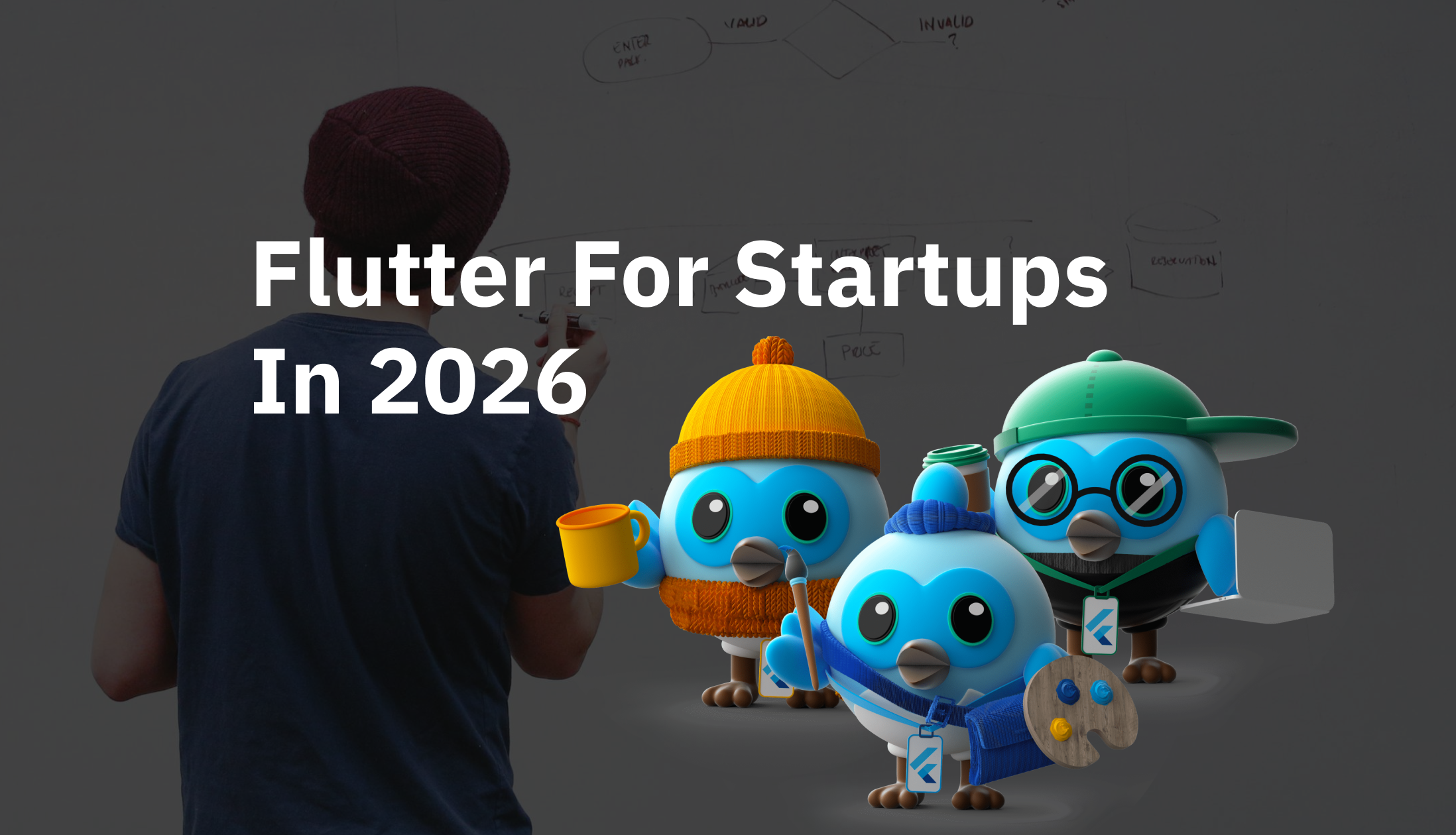AI in App Development: An Intro Guide for Business
This isn’t ChatGPT talking — just clear, down-to-earth insights on how AI in app development supports business growth (without the hype).
AI is no longer just a buzzword. It’s becoming a practical force in software development, helping mobile apps get smarter, more engaging, and better at connecting with users. From recommendations and automation to personalized experiences, AI is powering apps that drive stronger results for businesses.
In this article, we’ll look at where AI delivers value in mobile apps, how it fits into app development, and why Flutter is a powerful tool for building modern AI-powered apps (we weren’t going to skip that part!).
How AI fits into mobile app development
Basically AI plays two key roles in mobile app development, each adding value in its own way.
- Behind the scenes, it helps teams work smarter by automating tasks, speeding up testing, and guiding design with data.
- Inside the app (and that’s the focus here) – AI powers features like chatbots, voice commands, recommendations, and predictions. These are the tools that make apps feel smarter, more useful, and more engaging.
But what actually makes a mobile app “AI-powered”?
AI-powered mobile apps go beyond basic functionality. They use artificial intelligence to create experiences that feel personal, adaptive, and responsive. In most cases, this means the app can:
- Understand what users need — offering recommendations, reminders, or helpful next steps.
- Automate simple tasks — such as filling forms, sorting messages, or filtering content.
- Learn and improve over time — making search smarter, recommendations sharper, and interactions more relevant.
Examples of AI features in apps include:
- A shopping app that suggests products based on a user’s style or browsing history.
- A language learning app that adjusts lessons in real time based on progress.
- A fitness app that adapts workout plans as users hit their goals.
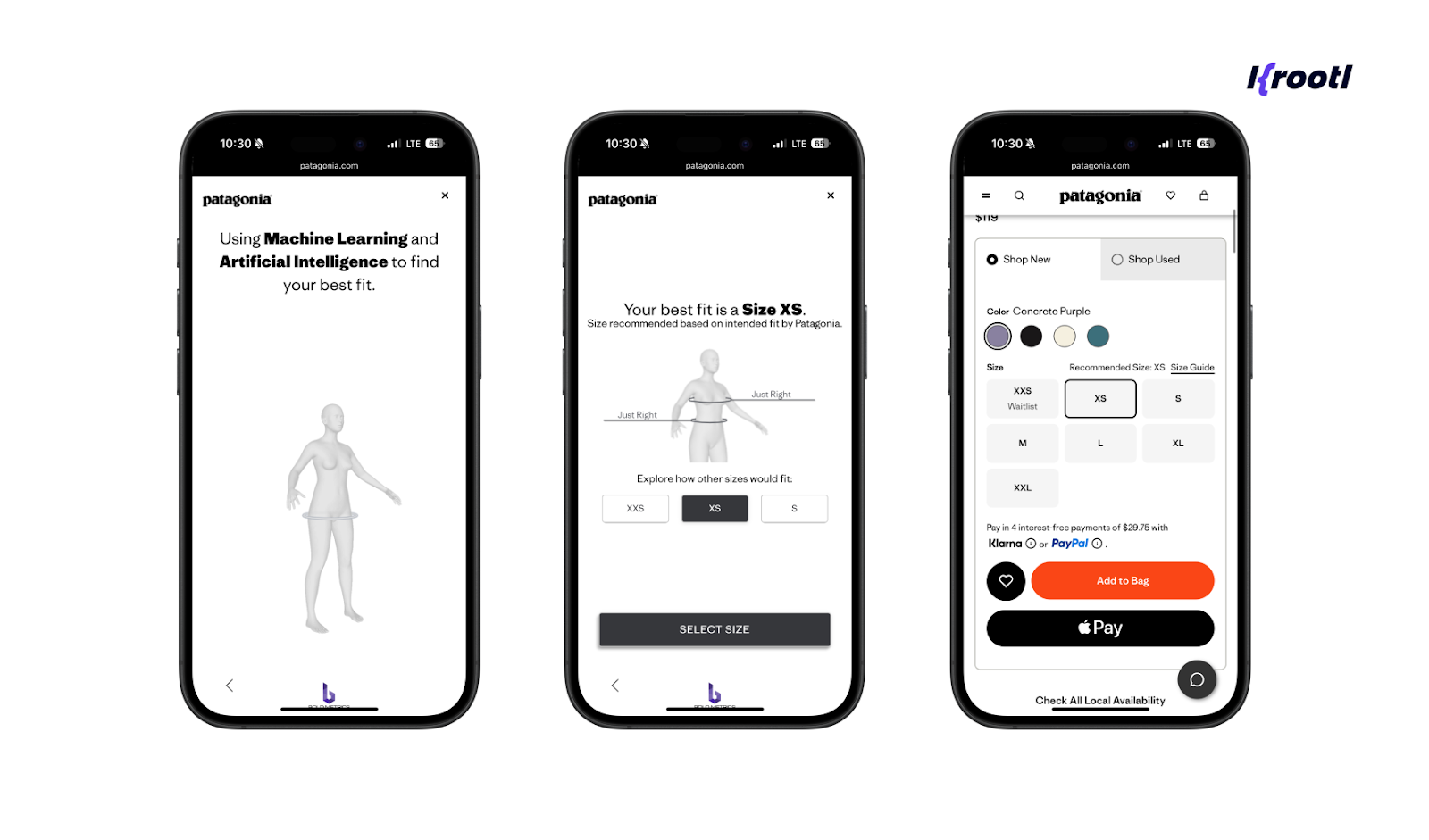
Why businesses turn to AI in mobile apps
For startups and growing businesses, it’s not just about adding AI because it’s trendy – it’s about solving real problems and creating apps that can do more. That could mean improving user retention, driving sales through personalized offers, cutting operational costs with automation, or offering features that make the app stand out in a crowded market.
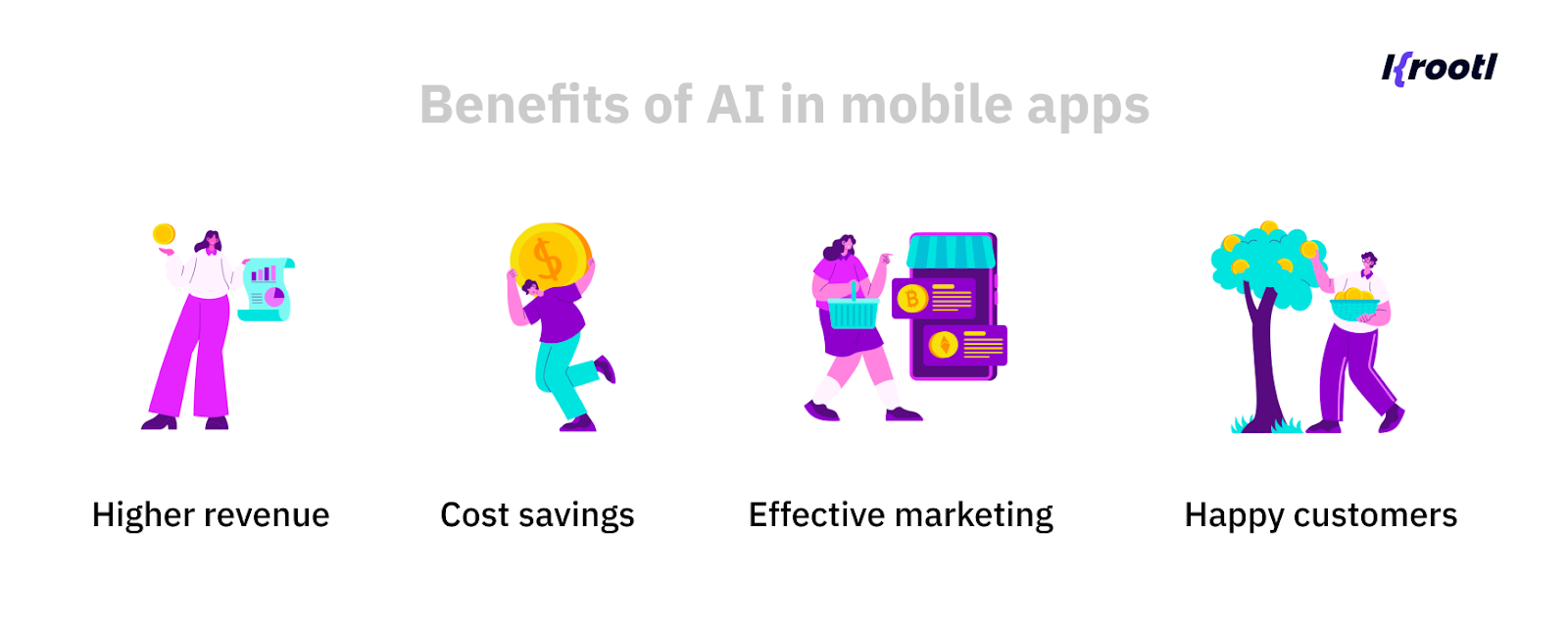
- Higher revenue — Recommendations, smart offers, and personalization drive conversions and increase order sizes
- Cost savings — Automated processes reduce the need for manual work, saving time and resources
- More effective marketing — AI supports audience segmentation and targeted communications
- Improved customer satisfaction — Faster responses and personalized experiences increase retention
Most common AI-powered features
Now let’s make a quick look at the most popular AI-powered features seen in modern mobile app development and where they add value
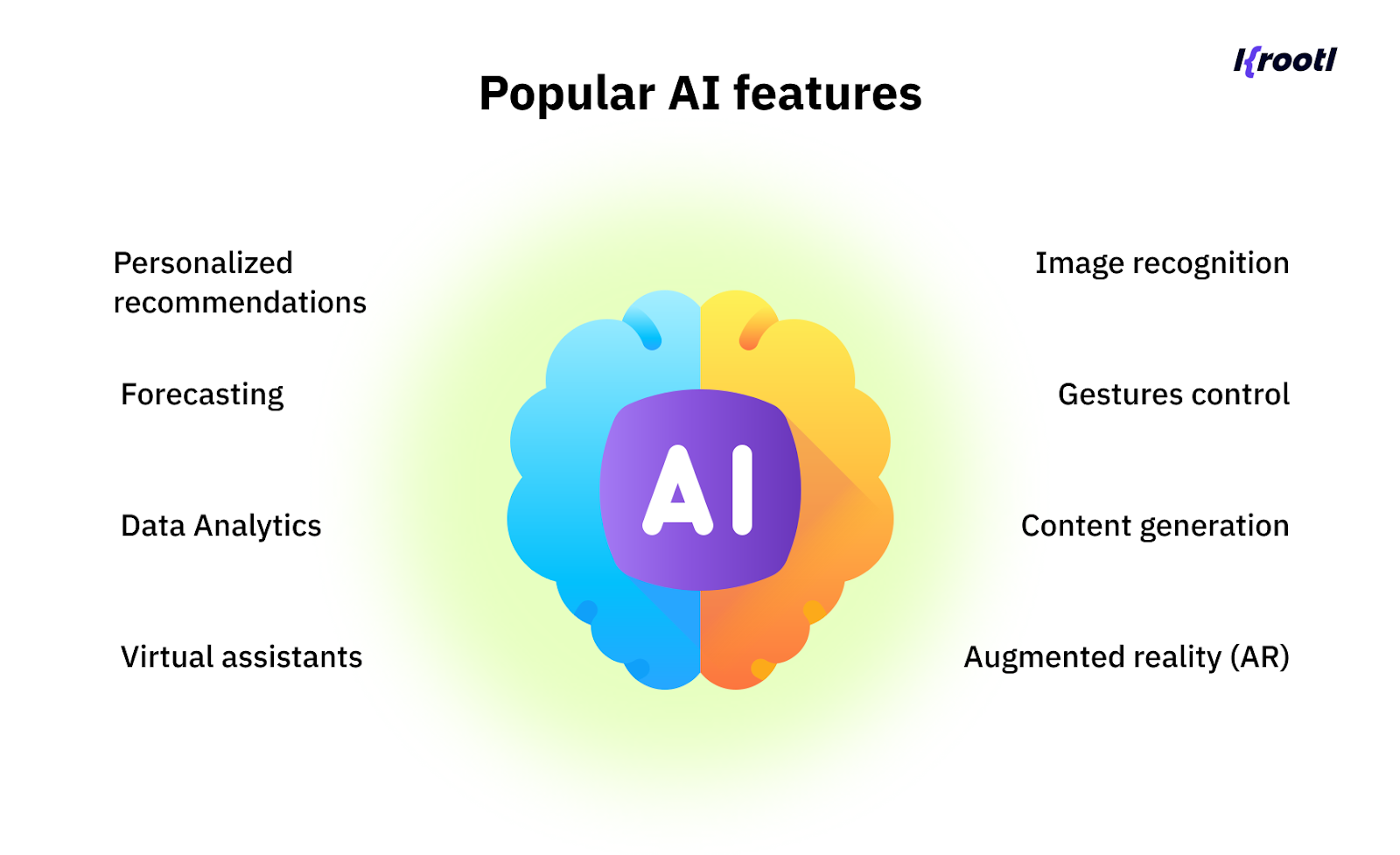
Personalized recommendations
AI tailors product, content, or ad suggestions based on what users like or do in the app.
Example: Netflix suggests shows based on individual viewing history.
Prediction and forecasting
AI analyzes trends and data patterns to help apps predict what’s likely to happen — whether that’s the weather, stock prices, or what a user might want next.
Example: The Weather Channel app uses machine learning to deliver location-specific forecasts.
Data analytics
AI helps apps process large data sets to spot patterns, improve decisions, and optimize features.
Example: Google Analytics applies machine learning to track and interpret user behavior.
Image recognition
AI identifies objects, faces, or text in images — powering features from AR search to security and product scanning.
Example: Google Lens helps users identify products, translate text, or scan barcodes.
Gesture control
AI enables new types of app interaction, using facial expressions, eye movement, or gestures.
Example: Snapchat AR filters respond to facial gestures in real-time to trigger the right animations.
Augmented reality (AR)
AI blends digital elements with the real world for immersive experiences.
Example: IKEA Place lets users preview furniture in their actual space.
Content generation
AI supports automatic creation of text, images, or designs — speeding up content production.
Example: Canva uses AI to suggest layouts and templates.
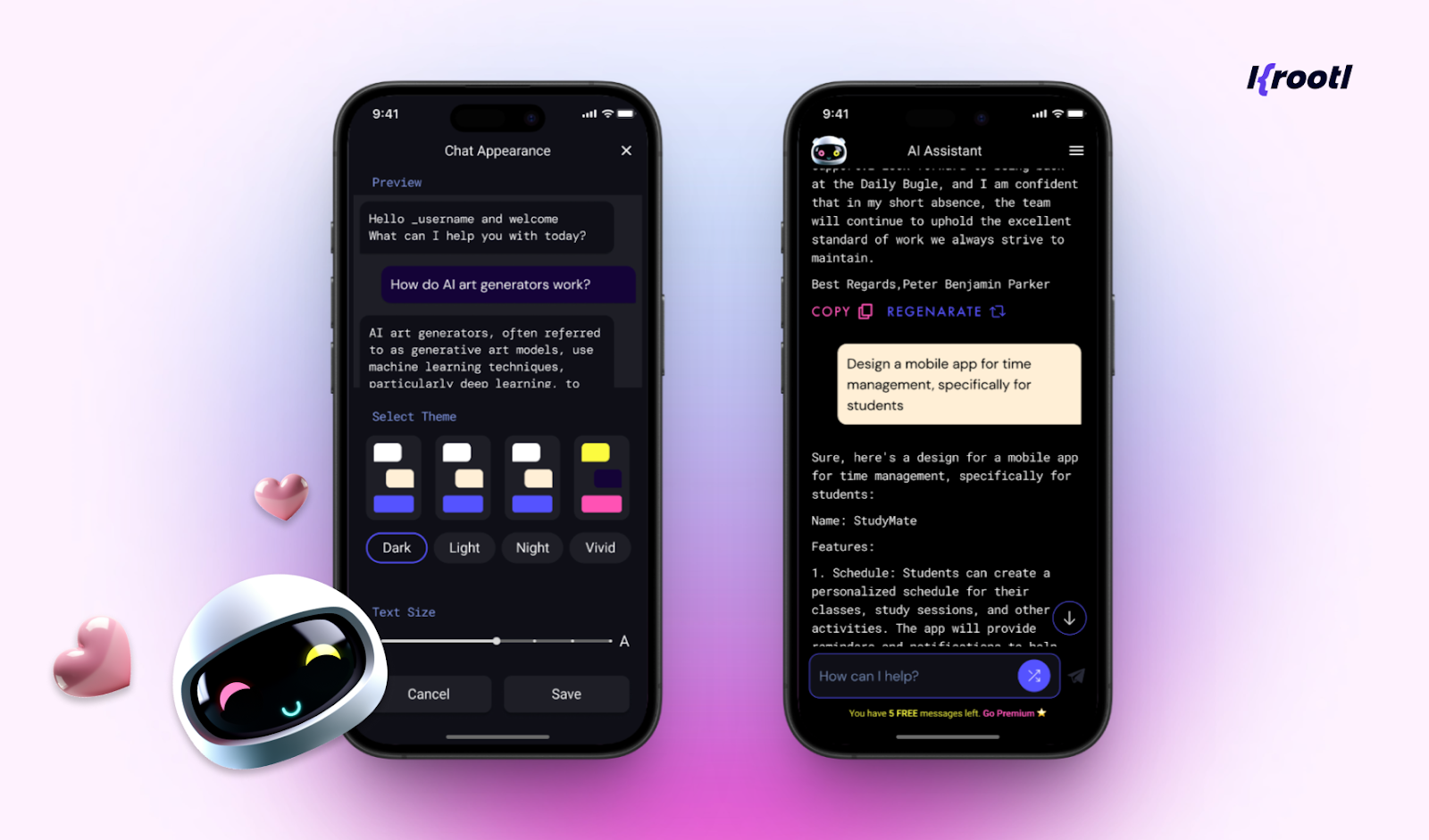
AI chatbots and automation
AI chatbots help apps talk back – answering questions, chatting with users, and offering help whenever it’s needed.
Example: We developed an AI Chatbot app powered by OpenAI’s GPT, designed to help users get instant, human-like responses to just about any question. Check it out on the App Store
Virtual assistants
AI helps apps handle queries, tasks, or recommendations, creating smoother, hands-free experiences.
Example: Google Assistant responds to voice commands; Replika engages in conversation.
Where AI fits: examples across industries
So it becomes clear that AI in mobile app development isn’t a one-size-fits-all solution. What works for a finance app might look very different in wellness, healthcare, education, or e-commerce. The right AI-powered features depend on what the app is designed to achieve and how it’s meant to serve users.
Below we will outline how businesses in different sectors are applying AI — and what value it brings to their products.
AI in financial apps
AI helps financial apps offer smarter, safer, and more personal experiences.
Common AI-powered features:
- Fraud detection using pattern recognition
- Spending insights and personalized budgeting advice
- Smart alerts for unusual account activity
- Predictive analytics for investment recommendations
Business benefits:
These AI-powered features help strengthen user trust with better security, improve engagement through real-time insights, and build loyalty through more personalized services.
AI in healthcare apps
AI in healthcare apps focuses on improving access to care and supporting faster, more accurate decision-making.
Common AI-powered features:
- Symptom checkers that learn from large datasets
- AI-based image analysis for diagnostics
- Chatbots for appointment scheduling or simple health queries
- Predictive models for medication or treatment reminders
Business benefits:
AI in healthcare apps helps speed up support and advice for patients, ease administrative tasks through automation, and enhance patient satisfaction with more accessible, responsive tools.
AI in wellness apps
In wellness apps, AI makes experiences more personal, adaptive, and supportive.
Common AI-powered features:
- Custom workout plans that adjust as users progress
- Smart habit tracking and motivational nudges
- AI-driven nutrition or mindfulness suggestions
- Sentiment analysis to adapt content and tone
Business benefits:
AI features in wellness apps help keep users engaged over time, support personal goals in a meaningful way, and encourage upgrades or premium subscriptions by offering smarter, tailored experiences.
AI in education apps
AI helps education apps feel more like personal tutors — adapting to each learner’s pace and needs.
Common AI-powered features:
- Personalized learning paths
- Adaptive quizzes and practice exercises
- AI chatbots to answer questions or explain concepts
- Speech recognition for language learning
Business benefits:
In education apps, AI helps increase learner retention by keeping content relevant, improves accessibility across languages and abilities, and adds value by simulating one-on-one support.
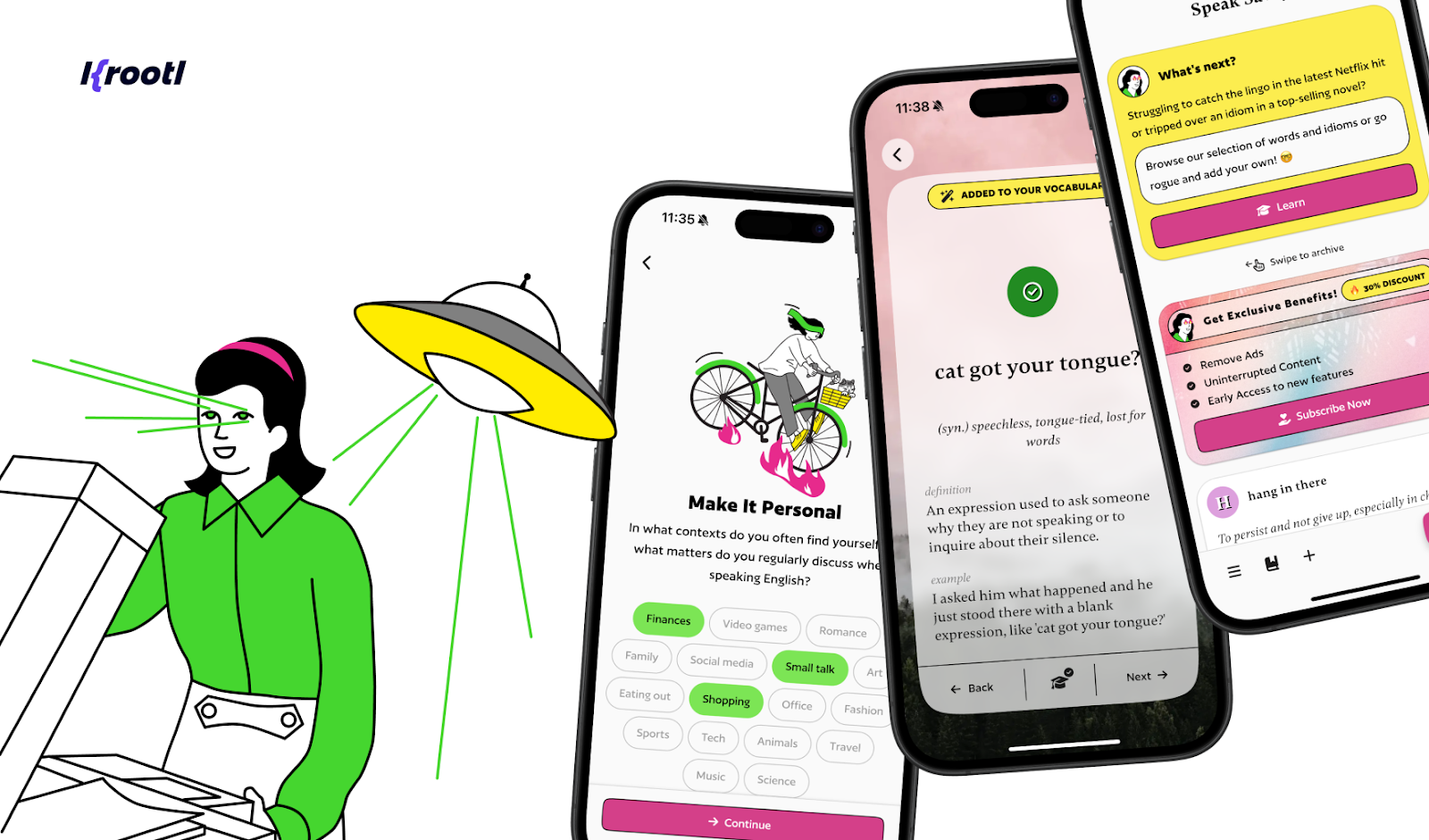
Check our case study on building a ChatGPT-powered vocabulary app where AI helped deliver a more engaging and personalized learning experience.
AI in e-commerce and delivery apps
AI in e-commerce and delivery focuses on smarter operations and better customer interaction.
Common AI-powered features:
- Product recommendations based on browsing and buying behavior
- Route optimization for faster delivery
- Demand forecasting to prepare for peak times
- AI chatbots and virtual assistants for instant order updates, support, and reorders
Business benefits:
AI features in e-commerce and delivery apps drive sales through personalization, reduce operational costs with smarter logistics, and improve customer satisfaction by delivering faster, more responsive service.
For any sector, AI works best when it’s focused on solving real problems — helping apps deliver stronger results for both users and businesses. So what powers these features under the hood? Let’s take a clear look at the core technologies behind AI-powered app development.
Technologies that power AI features in apps
Machine Learning (ML)
Machine learning is what lets apps spot patterns and make decisions based on data — without needing to be told exactly what to do at every step. It’s behind things like personalized recommendations, smarter search, or predicting what a user might want next. The more data it processes, the better it gets over time.
Deep Learning (DL)
Think of deep learning as the part of machine learning that handles really complex stuff. It uses multi-layer neural networks (inspired by how the human brain works) to power features like image recognition, speech-to-text, or predictive analytics. This is what helps apps feel truly smart — adapting to users, powering AR, or translating languages in real time.
Generative AI
Generative AI is all about creating new content — text, images, music, even video. It doesn’t just analyze data; it builds something new from it. In app development, this could mean AI-generated designs, automated copywriting, or dynamic content that makes the app feel fresh and engaging
Natural Language Processing (NLP)
NLP is what lets apps understand and work with human language. It powers voice commands, chatbots, and virtual assistants. Thanks to NLP, apps can support hands-free interactions, provide instant answers, and even hold basic conversations — making the experience smoother and more personal.
Computer Vision (CV)
Computer vision gives apps the ability to "see" and understand images and videos. It’s what makes visual search, face recognition, and AR features possible. Whether it’s scanning a product, identifying text in an image, or adding effects to a selfie — computer vision brings those features to life.
Challenges of AI integration in mobile app development
So far, it’s clear that AI can bring real value to mobile apps — powering features that make products smarter, faster, and more engaging. But as with any advanced technology, it’s not always simple to get right.
Before jumping into AI development, it’s worth understanding where the challenges lie. From cost and complexity to data requirements and ongoing maintenance, here are some key factors to consider when deciding how (and if) to apply AI in a mobile app.
Cost of development
Building AI systems from scratch — especially for things like image recognition, voice control, or predictive analytics — can be expensive. The good news is, there’s no need to reinvent the wheel. Pre-built AI models and libraries are widely available and can often be customized for specific app needs. This approach cuts costs, speeds up development, and still delivers powerful AI capabilities without blowing the budget.
Data requirements
AI needs data — and lots of it — to work well. Collecting, organizing, and securing that data is no small task. It’s essential to have systems in place that not only provide quality data but also meet data privacy standards like GDPR. Without the right data foundation, AI features won’t perform as expected.
Ethics and privacy
AI raises important questions around fairness, bias, and privacy. Whether it’s facial recognition, predictive analytics, or chatbots, it’s crucial to ensure AI features are transparent, respect user privacy, and follow ethical guidelines.
Complexity of implementation
AI isn’t a simple plug-and-play feature. Custom AI models need to be trained, tested, and fine-tuned — and that takes time and expertise. The complexity is much lower when using pre-built models or AI services, which is often the smartest path for mobile apps looking to balance cost, speed, and functionality.
Ongoing maintenance
AI models aren’t static. They need regular updates to stay accurate and relevant as data changes and user behavior evolves. This means factoring in long-term maintenance to keep the app performing at its best.
Not every app needs AI. Sometimes simpler solutions achieve the same goals with less cost and complexity. The key is applying AI where it makes sense — where it solves a real problem or creates clear value for the business. Our AI development team helps businesses navigate these choices — balancing AI features, cost, and long-term value in a way that fits the product’s purpose.
Why Flutter works so well for AI-powered apps
When it comes to building AI-powered mobile apps, the tech foundation matters just as much as the AI features themselves. At Krootl, Flutter is our go-to framework – because it offers the flexibility and efficiency needed to deliver smart, scalable products.
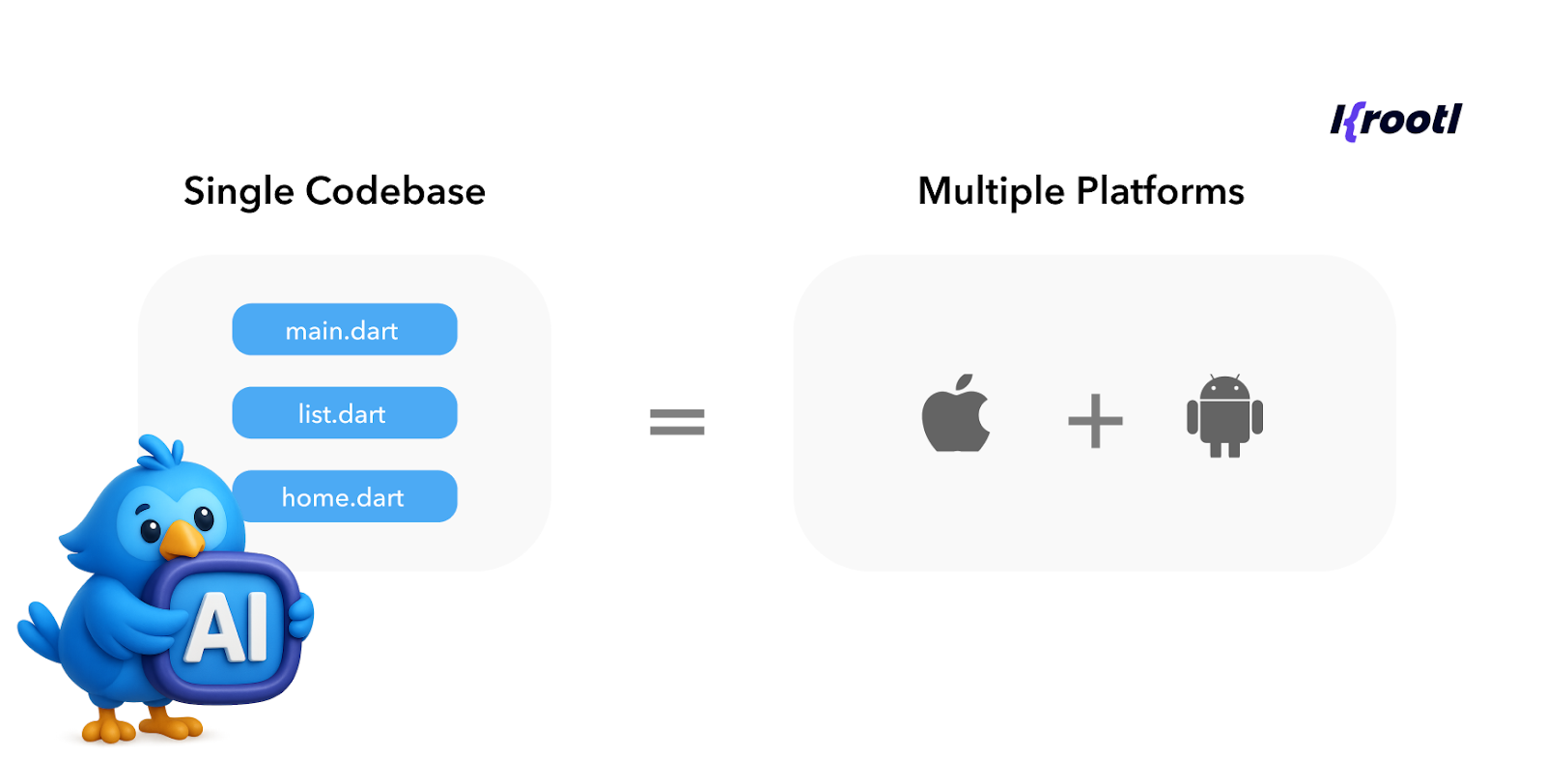
Flutter makes it easier to bring AI features to life in a way that’s smooth and future-proof. A single codebase means faster delivery for both iOS and Android. Its architecture works seamlessly with tools like TensorFlow Lite, OpenAI APIs, and custom AI models. The modern UI tools make designing clear, intuitive AI-driven interfaces simple. And because there’s no need for separate codebases, the overall development cost stays in check.
Learn more in our guide to why Flutter is a smart choice for your app.
But for us, it’s not just about using AI or Flutter for the sake of it. The focus at Krootl is on building solutions that actually fit the app’s purpose — integrating AI where it brings value, whether that’s through recommendations, automation, or features that help apps connect better with users.
Wrap-up
AI can be a game-changer for mobile apps. When applied strategically, it helps apps stand out, work smarter, and build stronger connections with users. But AI isn’t always the right fit for every project — and that’s okay.
The key is understanding the app’s goals and choosing the right tools to meet them. In some cases, an AI-powered app delivers the most value. In others, simpler solutions achieve the same results with less complexity.
At Krootl, we help businesses make these decisions with confidence — combining AI expertise with efficient Flutter development to create mobile apps that are practical, scalable, and built to deliver real value.







